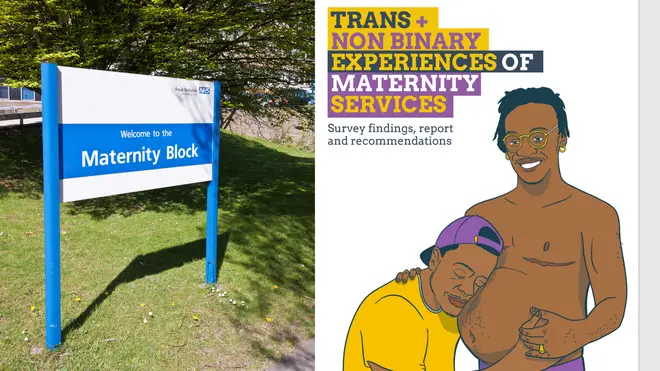
Vanessa Feltz 3pm - 6pm
28 April 2022, 23:36 | Updated: 28 April 2022, 23:42

Midwives have been told not to use gendered phrases including "breastfeeding" and "vaginal birth" to ensure trans and non-binary pregnant people feel supported, a Government report has said.
Maternity services across the UK have be told to swap the term "breastfeeding" for more inclusive phrases such as "chestfeeding or infantfeeding.
Whilst midwives have been instructed to swap the words "vaginal birth" for "frontal or lower birth" in a bid to make trans and non-binary people feel more comfortable during pregnancy.
The report by the LGBT Foundation was commissioned by the Government to explore the disparities in maternity services for those who do not identify as female.
The recommendations were made after gathering the responses from 121 trans and non-binary people in the UK who had first hand experience of maternity services in Britain.
Read more: 'Woke' uni slammed for telling females not to challenge trans people using 'wrong' toilets

'The House stands with you' - Boris Johnson publicly supports Jamie Wallis after MP comes out as trans
It comes after Brighton and Sussex University Hospitals NHS Trust made the change to call breastmilk as "human milk".
The report stated: "Traditional terminology may induce dysphoria or discomfort for trans and non-binary parents."
It also suggests trans and non-binary people "benefit greatly" from being offered private rooms instead of being treated in women's labour wards.

Trans rights campaigning is 'anti-women', says Tom Bower
The report states: "An important lesson from this data is that some trans and non-binary birthing parents benefit greatly from being offered a private space, although each birth parent will have different preferences.
"Some may not wish to be singled out, or to be at risk of being identified as trans by others.
"As such there should be no requirement for trans and non-binary birth parents to be treated differently, and instead there should be a focus on choice and individualised care."
One respondent, who identifies as a "non-binary, disabled, black or black British African, told the LGBT Foundation: "Felt like I was often being judged and it was an overall very awkward situation, in an already uncomfortable experience.
"Some staff even treated me as if I wasn't there to experience actual childbirth, and instead were just waiting for the child to arrive. It didn't feel like an inclusive situation - it was all about the child, rather than my experiences/how I was feeling."
Another report participant, who identifies as a gay, white British man said: "I didn’t have to go to a ward full of women after giving birth, I was actually provided with a private room for me and baby which was very helpful and accommodating for me and my gender identity."
Read more: Trans police officers who were born male but identify as female can search women

Two trans men share their advice to MP Jamie Wallis
Other suggestions made in the report include using the term "pregnant people" instead of "pregnant women" and having NHS staff with identity badges which show their preferred pronouns.
The report highlighted that over one in four trans birth parents said that during labour and birth they were not spoken to in a way which respected their gender and a further 30 per cent said they were only spoken to with respect only sometimes.
Whilst 28 per cent of respondents said they had not been treated with 'dignity and respect' during both labour and birth.
The report reads: "While many service users are cis women, and there is already language in place that they may be comfortable with, there are also many ways to use language that is more inclusive to trans and non-binary pregnant people.
"For example, some trans and non-binary people use the terms chest feeding or body feeding, rather than breastfeeding.
"Others are completely comfortable with the term breastfeeding.
"It is not possible to guess the language that someone might use to describe themselves based on how they look or sound, or who they are in a relationship with. Always ask people directly about the language that is appropriate to describe them, their bodies, and their experiences. "
The LGBT Foundation recommend the NHS provide staff with "best practice guidance about inclusive language across perinatal services at a national level" to ensure consistency for trans and non-binary pregnant people.